

What Drives Student Motivation? Daniel Pink, a leading author in the area of changing the world of work, introduced three primary concepts as the basis for motivation: autonomy, mastery and purpose.
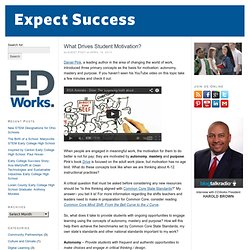
If you haven’t seen his YouTube video on this topic take a few minutes and check it out. When people are engaged in meaningful work, the motivation for them to do better is not for pay; they are motivated by autonomy, mastery and purpose. Pink’s book Drive is focused on the adult work place, but motivation has no age limit. What do these concepts look like when we are thinking about K-12 instructional practices?
A critical question that must be asked before considering any new resources should be “Is this thinking aligned with Common Core State Standards?” So, what does it take to provide students with ongoing opportunities to engage learning using the concepts of autonomy, mastery and purpose? Constructivism and the Student-Centered Approach. "When you make the finding yourself — even if you’re the last person on Earth to see the light — you’ll never forget it.
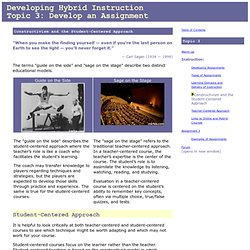
" The terms "guide on the side" and "sage on the stage" describe two distinct educational models. Student-Centered Approach It is helpful to look critically at both teacher-centered and student-centered courses to see which technique might be worth adapting and which may not work for your course. Student-centered courses focus on the learner rather than the teacher. Student-centered teaching is based on the constructivist model in which students construct rather than receive or assimilate knowledge. In "The Virtual Classroom: Learning Without Limits Via Computer Networks," Roxanne Star Hiltz describes the student-centered constructivist model of teaching: "Constructivist learning models require active input from students and requires intellectual effort and aids retention.
Example: Eleven facts about a banana. 4 Traits of Effective Learners. Whether or not you’re a student who just headed back to school, everyone should strive to learn new things throughout their lives.
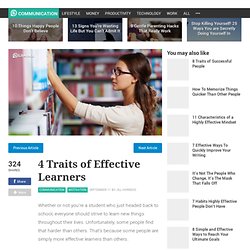
Unfortunately, some people find that harder than others. That’s because some people are simply more effective learners than others. 7 Things Smart Learners Do Differently. All people were born with great gifts, talents and potential, including you.

4 Key Characteristics of Effective Learners. Read a Book in 15 Minutes Try it for free.
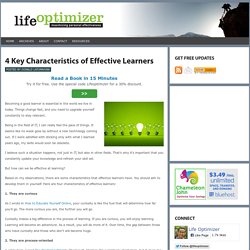
Use the special code Lifeoptimizer for a 30% discount. Becoming a good learner is essential in the world we live in today. Things change fast, and you need to upgrade yourself constantly to stay relevant. Being in the field of IT, I can really feel the pace of things. It seems like no week goes by without a new technology coming out. I believe such a situation happens, not just in IT, but also in other fields. How to Memorize Things Quickly.
People like to joke that the only thing you really “learn” in school is how to memorize.

As it turns out, that’s not even the case for most of us. If you go around the room and ask a handful of people how to memorize things quickly, most of them will probably tell you repetition. That is so far from the truth, it’s running for office. If you want to memorize something quickly and thoroughly, repetition won’t cut it; however, recalling something will. The problem is that recalling something requires learning, and we all learn in different ways. Before we start, you need to establish something: are you an auditory, visual, or experiential learner? Step 1: Preparation To optimize your memorization session, pay close attention to which environment you choose. Next, start drinking some tea. As we get older, toxic chemicals will damage our neurons and synapses, leading to memory loss and even Alzheimer’s.
10 Healthy Foods That Make You Smarter. Does what you eat make you smarter?

Yes and no. While a well-balanced diet won’t transform you into a Jeopardy champion, it will sharpen your thinking ability. How alert do you feel after eating a greasy bag of fast food or cream-filled doughnut? The road to Food Coma is paved with empty calories devoid of nutritional content. Your brain will perform better if fueled by healthy fats, fiber, protein, vitamins, and antioxidants.
8 Ways to Train Your Brain to Learn Faster and Remember More. You go to the gym to train your muscles.
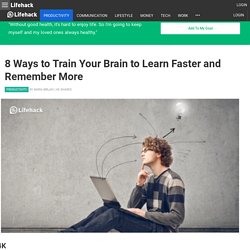
You run outside or go for hikes to train your endurance. Or, maybe you do neither of those, but still wish you exercised more. Well, here is how to train one of the most important parts of your body: your brain. 10 Things to Stop Saying to Your Kids (and What to Say Instead) Foods to Avoid: 10 Foods That Make You Less Smart. There has always been a lot of hype around foods that make you smart.

This is why college students eat bananas when they study and why the product Smart Water is so popular. But have you ever thought about foods that make you dumber? It’s true that researchers at prestigious universities, such as UCLA and Oxford University, have found that there are certain foods that make you less smart. It turns out that “eating dumb” diminishes all of your efforts to be smart. Eating poorly affects your alertness, memory, mood and your nervous system, such as your neuromuscular response time. 1.
The idea that eating too much sugar is bad for you isn’t anything new, but eating a lot of sugar over an extended period of time causes neurological problems. 2.